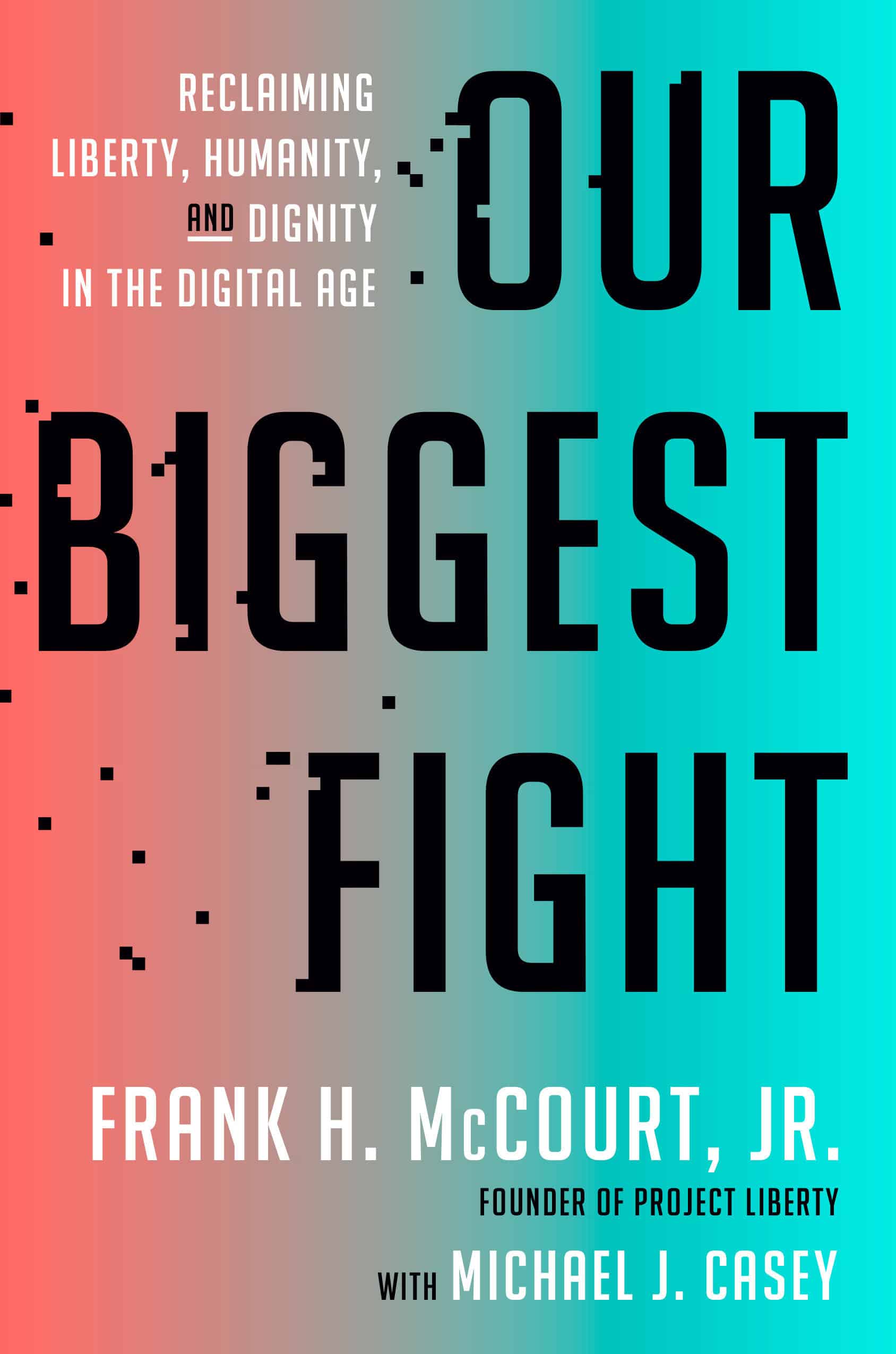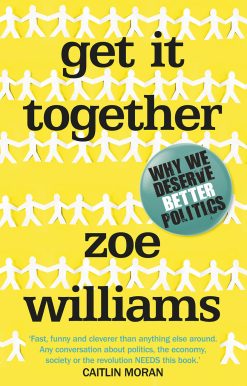Our Biggest Fight: Reclaiming Liberty, Humanity, and Dignity in the Digital Age
21.00 JOD
Please allow 2 – 5 weeks for delivery of this item
Add to Gift RegistryDescription
NATIONAL BESTSELLER • The internet as we know it is broken. Here’s how we can seize back control of our lives from the corporate algorithms and create a better internet—before it’s too late.“In the spirit of Thomas Paine’s Revolution-era Common Sense, this manifesto challenges us to create new digital architectures to safeguard democracy.”—Walter Isaacson, #1 New York Times bestselling author of Elon MuskIt was once a utopian dream. But today’s internet, despite its conveniences and connectivity, is the primary cause of a pervasive unease that has taken hold in the U.S. and other democratic societies. It’s why youth suicide rates are rising, why politics has become toxic, and why our most important institutions are faltering. Information is the lifeblood of any society, and our current system for distributing it is corrupted at its heart. Everything comes down to our ability to communicate openly and trustfully with each other. But, thanks to the dominant digital platforms and the ways they distort human behavior, we have lost that ability—while, at the same time, we’ve been robbed of the data that is rightfully ours.The roots of this crisis, argue Frank McCourt and Michael Casey, lie in the prevailing order of the internet. In plain but forceful language, the authors—a civic entrepreneur and an acclaimed journalist—show how a centralized system controlled by a small group of for-profit entities has set this catastrophe in motion and eroded our personhood. And then they describe a groundbreaking solution to reclaim it: rather than superficial, patchwork regulations, we must reimagine the very architecture of the internet. The resulting “third-generation internet” would replace the status quo with a new model marked by digital property rights, autonomy, and ownership.Inspired by historical calls to action like Thomas Paine’s Common Sense, Our Biggest Fight argues that we must act now to embed the core values of a free, democratic society in the internet of tomorrow. Do it right and we will finally, properly, unlock its immense potential.
Additional information
| Weight | 0.4 kg |
|---|---|
| Dimensions | 2.2 × 14.7 × 21.8 cm |
| PubliCanadation City/Country | USA |
| Author(s) | |
| Format Old` | |
| Language | |
| Pages | 224 |
| Publisher | |
| Year Published | 2024-3-12 |
| Imprint | |
| ISBN 10 | 0593728513 |
| About The Author | Frank H. McCourt, Jr. is the executive chairman of McCourt Global, a private family enterprise working across the real estate, sports, technology, media, and capital investment industries. He is the founder and executive chairman of Project Liberty, a broad-based effort to build a better web for a better world. The project includes the development of an open internet protocol (the Decentralized Social Networking Protocol), which shifts data rights from platforms to people, and an institute—launched with founding partners Georgetown University, Stanford University, and Sciences Po—to advance research and develop a governance framework for the internet’s next era.Michael J. Casey is Chief Content Officer at the award-winning media company CoinDesk, host of the “Money Reimagined” podcast, and the Chairman of the Consensus conference. He has worked as a journalist on five continents, including eighteen years with Dow Jones and The Wall Street Journal, and was a founding staffer at MIT's Digital Currency Initiative. Casey’s previous books include The Age of Cryptocurrency, The Social Organism, and The Truth Machine. |
“In the spirit of Thomas Paine’s Revolution-era Common Sense, this manifesto challenges us to create new digital architectures to safeguard democracy. Frank McCourt and Michael Casey’s Our Biggest Fight is an important book as we enter the era when artificial intelligence meets social media.”—Walter Isaacson“The Internet has reshaped our economies, societies, and personalities—and AI is about to do it again. And so it’s a perfect moment for Our Biggest Fight, McCourt and Casey’s impassioned manifesto about how to build a human-centered digital future. Everyone who cares about the changes and the challenges that lie ahead should read this book.”—Nicholas Thompson, CEO, The Atlantic“By illuminating the perverse incentives in Big Tech’s business models, Frank McCourt demonstrates just how unacceptable our current predicament is. Our Biggest Fight is a powerful call to arms to demand something different—for our society, and for ourselves.”—Tristan Harris, cofounder of the Center for Humane Technology“Something is deeply broken in our society, and it is getting worse fast. In this short and beautifully written book, Frank McCourt and Michael Casey show us how the internet, which once held out the promise of a better world, has been captured and corrupted by companies that take our data, ignore our rights, and harm our children. The authors then lay out what a better internet architecture would do, and they show us that it is already taking shape. This is an inspiring and hopeful book—a roadmap to ‘a digital future with humans at the center.’”—Jonathan Haidt, NYU-Stern School of Business professor, author of The Righteous Mind, and co-author of The Coddling of the American Mind“Everyone understands the pathologies of our current internet and social media worlds. But you can’t leave something behind unless you have a new place to go. McCourt shows us how to reach this new and better digital future.”—Rob Reich, McGregor-Girand Professor of Social Ethics of Science and Technology, Stanford University“Our Biggest Fight takes a hard look at today’s internet and social media platforms, how they are impacting our children, communities, society and democracy and demands we address these issues head on. McCourt and Casey inject much-needed hope into the urgent conversation about how we might reshape technology to prioritize people over profits.”—Dan Porterfield, president and CEO of The Aspen Institute“Striking the perfect balance of honesty and hope, Frank McCourt and Michael Casey send a clear and compelling message: today’s internet is fundamentally broken, but together, we can build a better web.”—Darren Walker, president of the Ford Foundation“No one has done as much as Frank McCourt to invest in the development of a more humane and plural digital world. Finally, we have his full vision for rewriting the constitution of the internet.”—Glen Weyl, economist and author |
|
| Excerpt From Book | Chapter OneThe Heart of the Problem: An Obsolete Internet DesignA war in Eastern Europe. A war in the Middle East. The hottest summer in recorded history. An opioid epidemic killing three hundred people a day. Tens of thousands of migrants teeming across the southern border. Train derailments. Mass shootings. Pothole-riddled highways. Surging interest rates pushing the dream of homeownership out of reach for many.This snapshot of American life, from late 2023, shows a house that’s well and truly on fire. The response in Washington, you’d be forgiven for assuming, would be a desperate, unified effort to fight the flames. Yet the conflagration coincided with a leadership vacuum: A rabble-rousing segment of the fractured majority party in the House of Representatives had just ousted its Speaker, leaving the urgent business of government at a standstill for weeks.Amid it all, a profound mistrust of politicians and the institutions of government was growing ever more entrenched. As the country approached the 2024 presidential election, polls showed that most Americans had unfavorable opinions of the two front-runner candidates—one a twice-impeached former president facing four criminal indictments, the other a sitting president confronting his own impeachment threat in the House. Regardless of who the nominees would end up being, everyone was bracing for a tense, yearlong slanging match consumed with hyperbole, mockery, ad hominem attacks, and an utter lack of nuance, compromise, or middle ground—all with the threat of violence hanging ominously in the air.With these extreme, often brutal divisions penetrating all layers of society, from state legislatures to town councils to school boards, several nagging questions loomed: Why do we seem so ungovernable? Why is our decision-making apparatus paralyzed? How did we become singularly focused on one-upmanship and gotcha tactics rather than on the common need for effective, consensus-based policymaking?The answer lies in the failings of our information system. A healthy democracy depends on a healthy system for producing and distributing information, and the truth is that the one we’ve come to rely on over the past three decades—the sprawling global network of interconnected computers we call the internet—has become decidedly unhealthy. As currently structured, the internet enables the secretive, centralized aggregation of massive troves of personal and social data generated by our online interactions. That system has empowered a small group of tech companies and their clients to exert untold influence over us. With hidden, proprietary, and self-updating algorithms that are constantly learning from our data, they curate the torrent of content flowing through social media that has become the primary source of information for billions of people. In doing so, they’ve learned how to tap into our most basic instincts to engender the conditions that maximize our engagement with their online platforms and, by extension, their profits. Some time back, they learned that engagement is most easily optimized when we are triggered. So, inevitably, their algorithms—a form of artificial intelligence—built a machine that would encourage the kind of toxic, antisocial behavior that’s destroying the fabric of society.This digital system extends far more deeply into our lives than any of the information systems on which earlier civilizations depended, far more even than the internet’s early designers expected when they started linking hardwired mainframe and desktop computers to one another in the 1970s. Now this system encompasses all the connected devices we interact with—from our smartphones to our TVs to our cars to our home security systems—forming a network called the Internet of Things. This network even provides the backbone of our financial system and of the global economy’s supply chains.The internet has become inseparable from life itself—to the point where our DNA, our fundamental biological makeup, is now also fully digitized. In a recent conversation I had with Broad Institute director, Todd Golub, a world leader in applying genomic tools to cancer research, he explained that the cost of the first sequencing of the human genome in 2003 was $3 billion. Now, with the cost approaching $100 per person, every child born in the developed world will soon have their genome sequenced. Todd asked me to consider three questions: Who will own that individual’s data? Where will it be stored? And who gets to use it for what purpose? These questions are fundamental because, as we noted in the introduction, there is no longer any separation between our digital and our real-world existences. Again, whenever we say “your data,” think “your personhood.”Where does this leave us? We now find ourselves in the battle of our lives, a battle over the capacity to own who we are, to define our identity, to live as we choose, and to do so in a way that fosters a healthy coexistence with others.This is not some wacky conspiracy theory about a cabal of “deep state” puppet masters manipulating us behind the scenes. Nor is it Hollywood-imagined science fiction, an imperceptibly fake reality created for us by a band of vengeful androids—though that metaphor is quite useful here. Our predicament is the result of a flawed structure. Through our actions and lack of actions, we have permitted the development of a system that incentivizes corporate behavior and contradicts the broader interests of society. We can, and we must, change that model. This starts by recognizing and addressing the mistakes we made, the first of which was to grant a few monopolistic internet platforms access to an inordinate amount of personal data about us—our data, data that must be put under our control. The second was to let those platforms use that data to determine what information we see, hear, and absorb, and to allow them to do so in pursuit of their interests, not ours.Data is the lifeblood of the digital economy, more valuable than oil. Given the value of data, today’s tech giants enjoy an outrageous, unfair imbalance of power in their favor. They have the capacity to shape every aspect of your life: your job, your kids’ education and well-being, your healthcare. They’ve converted that power into the most impressive wealth-accumulation machine that Wall Street has ever seen. Throughout the three decades of the internet in its current, platform-dominated manifestation, the five biggest internet companies have grown to a combined market valuation that’s larger than the gross domestic product of any country other than the United States or China. For the rest of us, that same period has produced, on average, slightly higher real incomes—but at the cost of being overworked, overstimulated, and overstressed. Since the World Happiness Report’s survey of different countries’ emotional well-being began in 2015, the ranking for the United States has been sliding ever lower. It’s not all in your head.It doesn’t have to be this way.We can fix this. In fact, we must. We have arrived at an inflection point. Every day more people realize that our house is indeed on fire. Perhaps it’s the crisis we need, the kind that creates opportunity. It gives us a reason to go deeper than the surface-level problems to find their root, their common cause, to drill down into the core system that underpins all of it. But if this is a moment of opportunity, it is also a moment of great urgency, for it is about to become even more complicated by the explosive expansion of generative AI, a technology that Goldman Sachs estimates will replace 300 million jobs. The difference between generative AI and traditional AI is that the former can create something new rather than just perform preset tasks—think creating original art versus playing chess. The power of this new breed of AI, thrust into mainstream attention by OpenAI’s ChatGPT system, will eclipse that of the AI algorithms that have driven our social media feeds. We can use all this power for good, or we can succumb to it. Our humanity and, indeed, our very lives are at stake. |
Only logged in customers who have purchased this product may leave a review.






Reviews
There are no reviews yet.